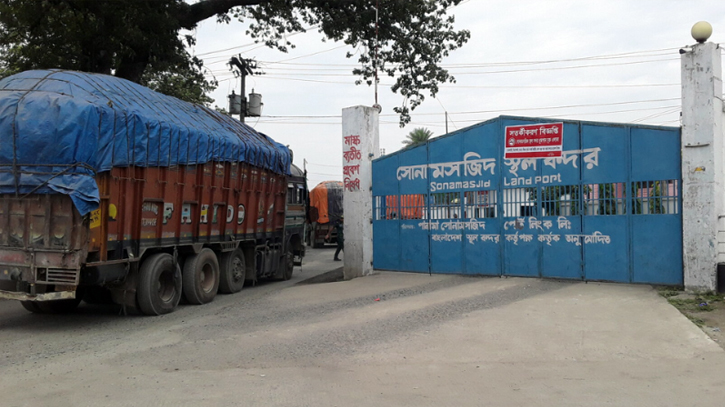
Photo: Collected
Despite existing anti-India sentiments among some segments of the population in Bangladesh, the overall relationship between India and Bangladesh remains friendly. However, there are perceptions within parts of civil society that the trade relationship between the two countries is not mutually beneficial. Some believe that India tends to dominate agreements, which affects the outcomes of trade deals.
In recent years, various agreements have been signed between India and Bangladesh. However, Bangladesh's priority product, garments, has seen a continuous decline in exports to India. Conversely, Bangladesh is moving forward with plans to import Re-gasified Liquefied Natural Gas (RLNG) from India via pipelines.
Besides, Bangladesh faces challenges in its trade relations with Nepal and Bhutan due to the requirement of Indian approval and involvement in facilitating business interactions with these countries.
According to the Bangladesh Garment Manufacturers and Exporters Association (BGMEA), garment exports to India declined significantly by 22.44 per cent from $889 million to $689.52 million during the period from July to April compared to the previous year. However, in the fiscal year 2022-23, garment exports to India had recorded $1,013 million, showing a growth of 41.54 per cent.
Professor Shamsul Alam, a prominent energy expert in Bangladesh, emphasised the risks associated with excessive dependency on India. He suggested that Bangladesh should focus on increasing its local energy production and consider direct imports from the international market, which could potentially be more cost-effective. This approach would reduce vulnerability to potential impacts from changes in the political regime in India that could affect existing agreements.
Bangladesh is currently importing fuel oil and electricity, and it is now planning to import Re-gasified Liquefied Natural Gas (RLNG) from India through pipelines, despite having its own Re-gasification terminal in Moheshkhali, Cox's Bazar.
Recently, on 11th June, the Cabinet Committee on Government Purchase approved a proposal to import 40 megawatts of hydropower from Nepal at a rate of Tk 8.17 per unit, including transmission charges, which will be transmitted through India.
Finance Minister Abul Hassan Mahmood Ali explained to the daily Messenger that there will be a tripartite agreement involving Bangladesh, India, and Nepal for the electricity import, as the electricity will pass through India's transmission lines.
Additionally, a deal is in progress between Bangladesh's state-owned oil, gas, and mineral corporation Petrobangla and GAIL (Gas Authority of India Limited) for a re-gasified LNG sales agreement with the private Bangladeshi firm Dipon Gas Company.
Zanendra Nath Sarkar, Chairman of Petrobangla, informed the daily Messenger that the Re-gasified LNG from H-Energy will primarily be utilised over a 22-year period to supply the 800 MW Rupsha combined-cycle power plant, which is owned by the state-run North West Power Generation Company.
According to Bangladesh Bank, India was the second-highest seller to Bangladesh in terms of merchandise trade during the fiscal year 2022-2023. India supplied goods worth Tk 94,033.0 crore, accounting for 13.9 per cent of Bangladesh's total imports during that period. This was a decrease compared to Tk 1,20,445.2 crore or 17.7 per cent in the previous fiscal year.
In 2022, Bangladesh exported goods worth $589 million to India. The major products exported to India included Non-Knit Men's Suits valued at $195 million, other Pure Vegetable Oils worth $163 million, and Textile Scraps amounting to $133 million.
Bangladesh currently imports 2,656 MW of thermal power from India. Additionally, from January to December 2024, Bangladesh plans to import approximately 3.8 million tons of various refined petroleum products. This includes 2.34 million tons of diesel (gas oil), 375,000 tons of Jet-A1 fuel, 275,000 tons of octane (Mogas), 750,000 tons of furnace oil, and 60,000 tons of marine fuel.
Looking ahead, Bangladesh aims to increase its electricity imports from neighboring India to 9,000 MW by 2050. The country is also progressing in its efforts to import hydro-electricity from Bhutan, facilitated through India. These initiatives highlight Bangladesh's strategic approach to meeting its energy needs through regional cooperation and imports.
Messenger/Fameema








